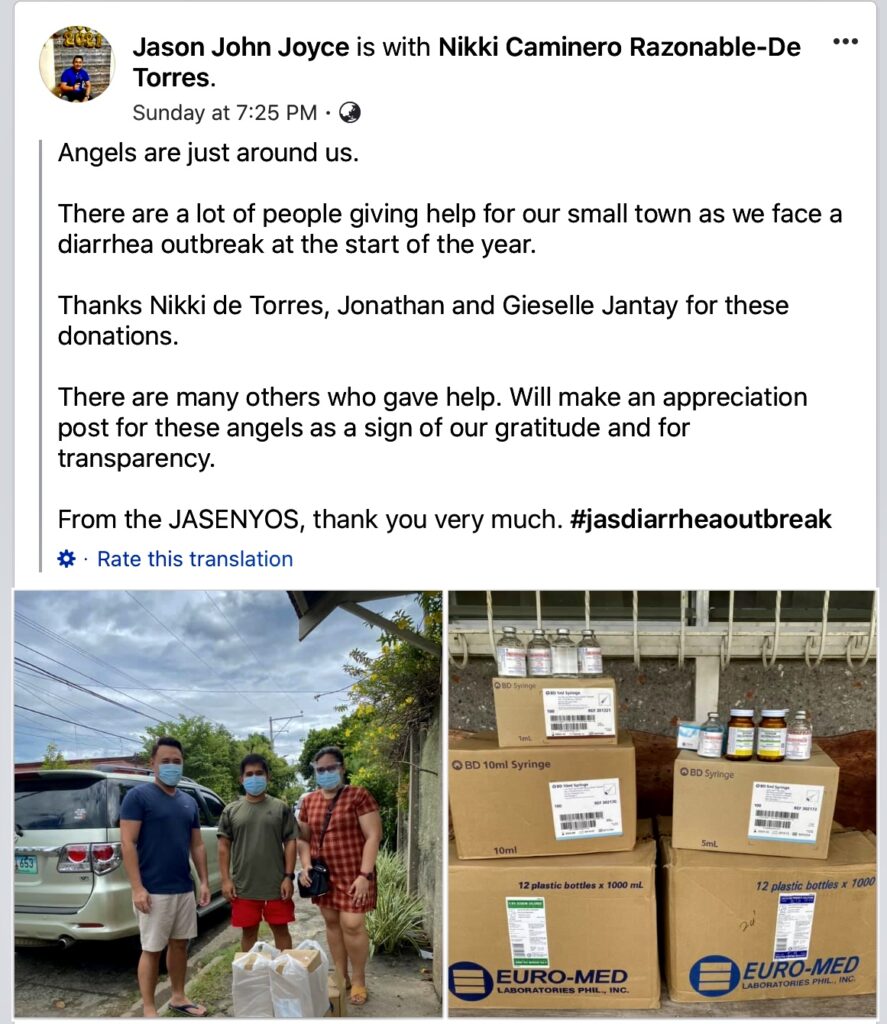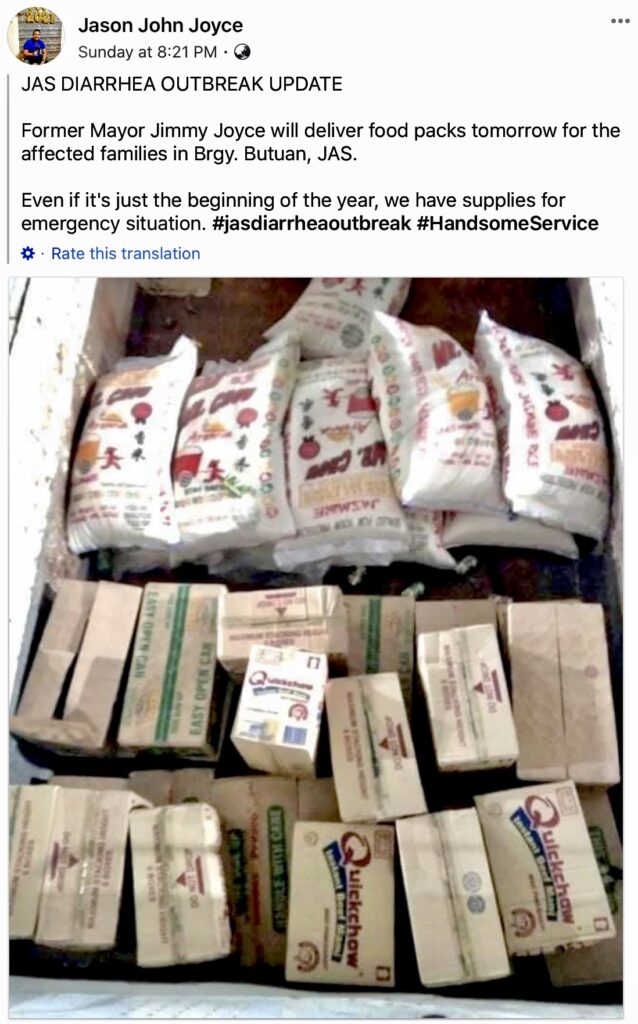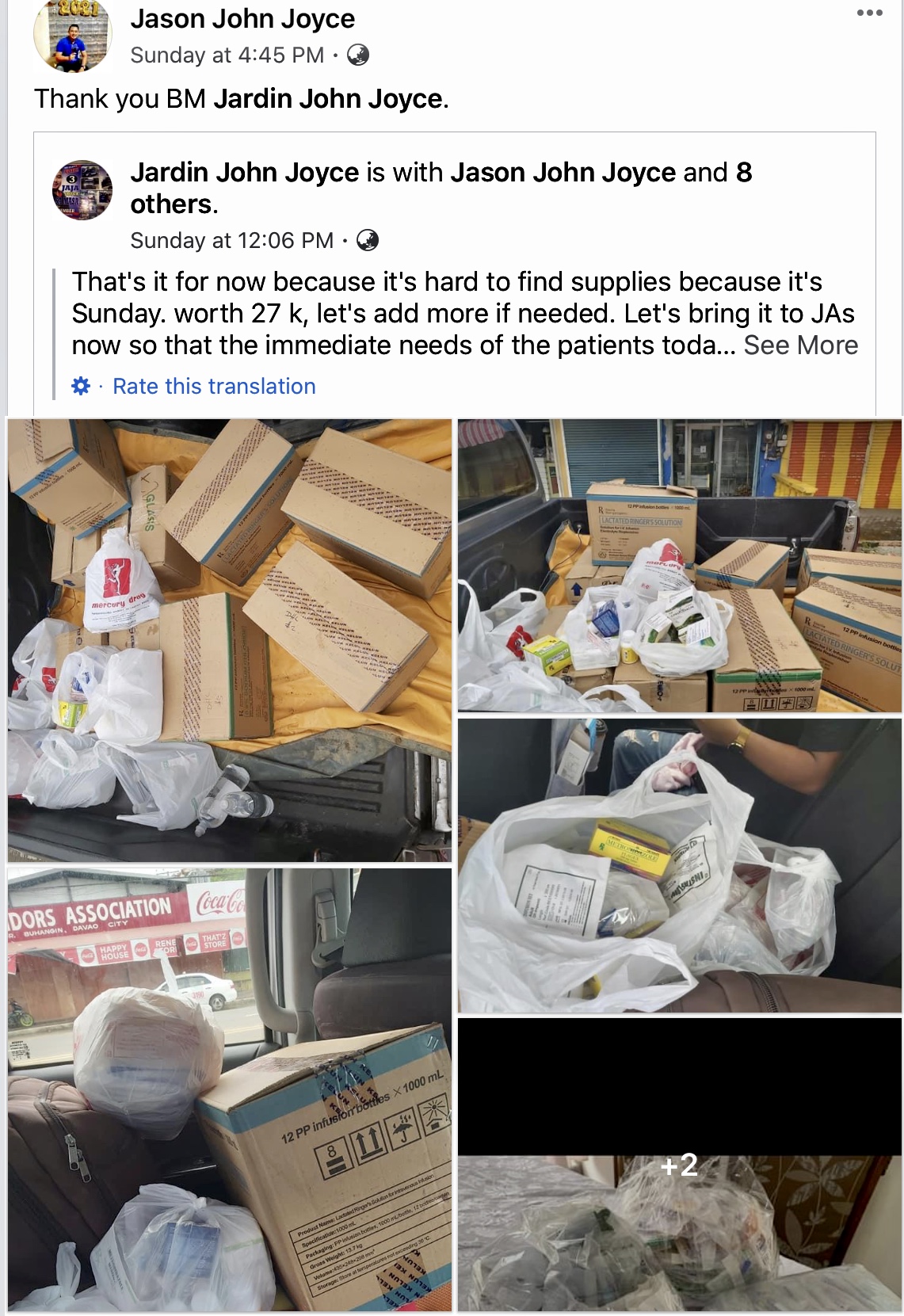By Henrylito D. Tacio
While the country welcomed the coming of 2021, some people in barangay Butuan, about 15 kilometers away from Jose Abad Santos in Davao Occidental, were undergoing health problems after drinking contaminated water.
“After I received the report, I immediately talked with our municipal health officer to send a team to the barangay,” Mayor Jason John Joyce posted in his Facebook account on January 3. “We also prepared dextrose and other medicines.”
Some of the victims, mostly children, were admitted to the district hospital and given oresol (oral rehydration solution) and some medicines. Oresol, according to the Mayo Clinic, is a formula used to replace electrolytes and fluids that are lost in the body.

Despite the immediate response of the government, there was one casualty. A 62-year-old man from sitio Malwayog was admitted to the hospital on December 30. He died of renal failure two days later.
“Water is life,” the old proverb insists. After all, water is one of those basic necessities in life. “It is a grave moral shortcoming if people cannot drink water without courting disease or death,” Worldwatch Institute’s Sandra Postel once penned.
The physician Hippocrates, the ancient innovator of medical ethics, advised that polluted water be boiled or filtered before being consumed.
“About 80 percent of all diseases and more than one-third of all deaths in developing countries are caused by contaminated water,” deplored Elizabeth Dowdeswell when she was still the executive director of the United Nations Environment Program.
“At any given time, an estimated one-half of people in developing countries are suffering from diseases caused either directly by infection through the consumption of contaminated water or food, or indirectly by disease-carrying organisms that breed in water,” the United Nations said in a press statement.
Diarrhea is one of those diseases. In 2008, the Geneva-based World Health Organization (WHO) listed diarrhea as the fourth leading cause of death among children less than five years old and the third leading cause of illness among children. “If the trend continues,” the United Nations health agency surmised, “it is expected to cause 10,000 deaths every year.”

Most cases of diarrhea, however, are self-limited, but they sometimes can lead to serious complications. The Ohio-based Cleveland Clinic states: “Diarrhea can cause dehydration (when your body loses large amounts of water), electrolyte imbalance (loss of sodium, potassium, and magnesium that play a key role in vital bodily functions) and kidney failure (not enough blood/fluid is supplied to the kidneys).
“When you have diarrhea, you lose water and electrolytes along with stool. You need to drink plenty of fluids to replace what’s lost. Dehydration can become serious if it fails to resolve (get better), worsens and is not addressed adequately,” the Cleveland Clinic adds.
Actually, there are several different ways to classify diarrhea. Acute diarrhea, the most common form, is loose, watery diarrhea that lasts one to two days. This type doesn’t need treatment, and it usually goes away after a few days.
Persistent diarrhea is a type of diarrhea that generally persists for several weeks – from two to four weeks. Diarrhea that lasts for more than four weeks or comes and regularly goes over a long period of time is called chronic diarrhea.
“Many cases of diarrhea are due to an infection in the gastrointestinal tract,” writes Medical News Today’s Markus MacGill. “The microbes responsible for this infection include: bacteria, viruses, and parasitic organisms.”
The most commonly identified causes of acute diarrhea are the bacteria Salmonella, Campylobacter, Shigella, and Escherichia coli. Some cases of chronic diarrhea are called “functional” because although all the digestive organs appear normal, they are not functioning as they ideally should.
Some other major causes of chronic diarrhea include microscopic colitis, malabsorptive and maldigestion diarrhea, chronic infections, drug-induced diarrhea, endocrine-related causes, and cancer-related causes.
But the question is: how will you know you have it? The website, webMD.com, states you may have diarrhea when you experience these: bloating in your belly, cramps, thin or loose stools, watery stools, an urgent feeling that you need to have a bowel movement, and nausea and throwing up.
The more serious symptoms include blood or mucus in your stool, weight loss, and fever. “If you have watery stools more than three times a day and you’re not drinking enough fluids, you could become dehydrated,” webMd.com states. “That can be a serious problem if it’s not treated.”
You need to go to the nearest hospital if you have: blood in your diarrhea or black, tarry stools; a fever that is high (above 101 F) or that lasts more than 24 hours; diarrhea lasting longer than 2 days; nausea or throwing up that prevents you from drinking liquids to replace lost fluids; and severe pain in your belly or rear end.
In addition, call your doctor right away if you have diarrhea and any of these signs of dehydration: dark urine; smaller than usual amounts of urine or, in a child, fewer wet diapers than usual; rapid heart rate; headaches; dry skin; crankiness; and confusion.
No one is spared from getting diarrhea. In fact, it’s not uncommon for most people to have diarrhea several times a year. It’s very common and usually not a major concern for most people.
But in some instances, the Cleveland Clinic cautions, diarrhea can be serious in certain groups of people, including young children, older adults (the elderly), and those with medical conditions.
MacGill states the following diet tips may help with diarrhea: sipping on clear liquids, such as electrolyte drinks, water, or fruit juice without added sugar; after each loose stool, replacing lost fluids with at least one cup of liquid; doing most of the drinking between, not during, meals; and consuming high potassium foods and liquids, such as diluted fruit juices, potatoes without the skin, and bananas.
The person suffering from diarrhea can also do the following:
- Consuming high sodium foods and liquids, such as broths, soups, sports drinks, and salted crackers.
- Eating foods high in soluble fiber, such as banana, oatmeal, and rice; this helps thicken the stool.
- Limiting foods that may make diarrhea worse, such as creamy, fried, high dairy, and sugary foods.
Among the foods and beverages that might make diarrhea worse include:
Sugar-free gum, mints, sweet cherries, and prunes.
Caffeinated drinks and medications.
Fructose in high amounts, from fruit juices, grapes, honey, dates, nuts, figs, soft drinks, and prunes.
Lactose in dairy products.
Magnesium.
- Anything that contains artificial sweeteners.
– (Photos are taken from the Facebook account of Mayor Jason John Joyce)

